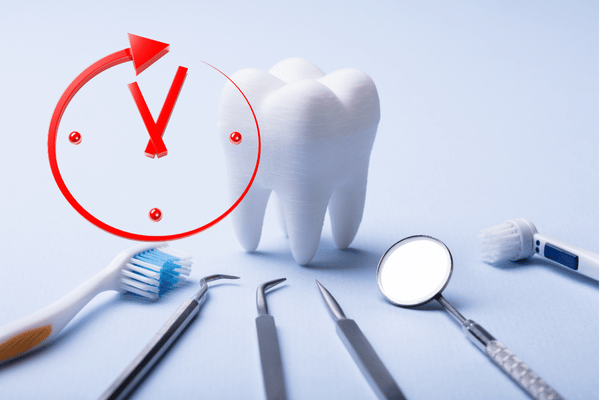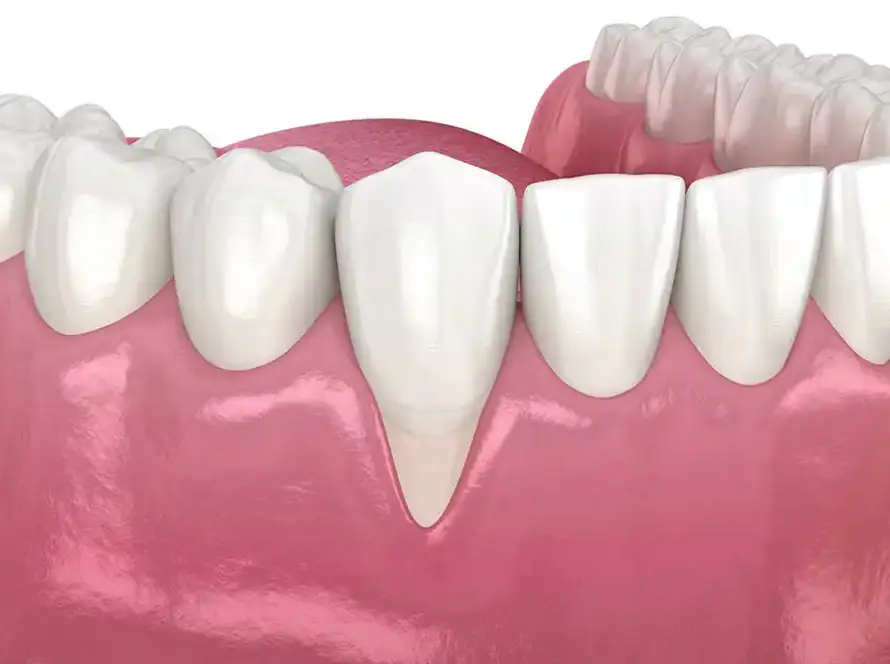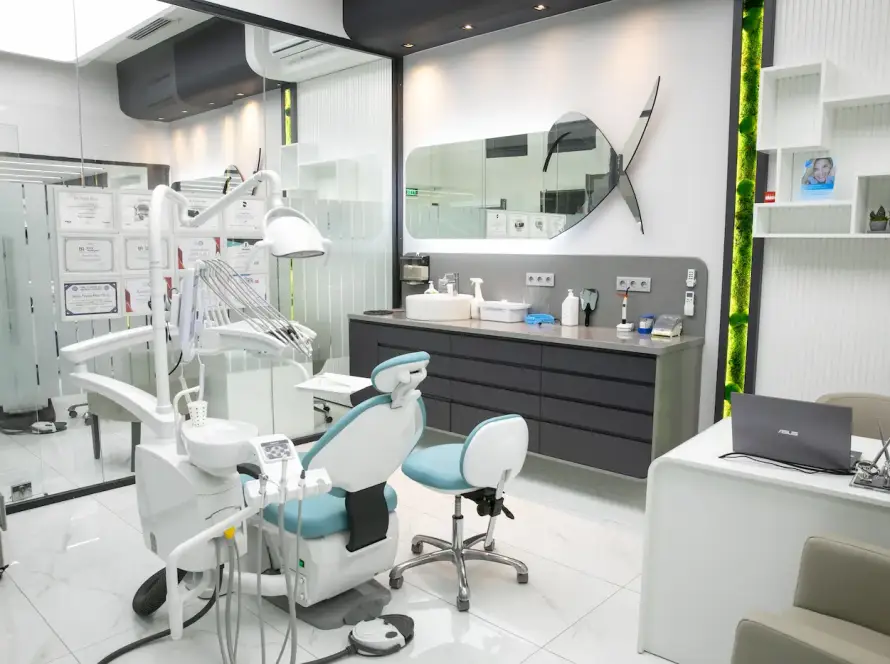Dental implants are artificial tooth roots, usually made of titanium, designed to provide a permanent base for fixed or removable replacement teeth. Unlike dentures, bridges, or partials, dental implants function similarly to natural teeth, offering a long term solution for individuals who have lost teeth due to decay, disease, or trauma. They become a robust foundation for dentist made crowns, bridges, or dentures.
Key Components of Dental Implants
- Implant Fixture: The actual screw like component that is placed into the jawbone to replace the tooth root.
- Abutment: The connector placed on top of the dental implant to hold and support the replacement tooth.
- Crown: The custom made artificial tooth that is attached to the abutment, designed to match the appearance and function of natural teeth.
Types of Dental Implants
- Endosteal Implants: The most common type, these implants are surgically inserted into the jawbone and serve as the root for the crown.
- Subperiosteal Implants: Positioned under the gum but on or above the jawbone, these are used for patients with insufficient bone height.
Importance of Dental Implants
- Functionality: They restore chewing efficiency, allowing patients to eat a variety of foods without restriction.
- Aesthetics: Dental implants help maintain facial structure, preventing bone loss and facial sagging associated with missing teeth.
- Durability: With proper care, dental implants can last a lifetime, making them a cost effective solution over the long term.
- Oral Health: Unlike traditional bridges, dental implants do not require the alteration of adjacent teeth, preserving overall dental health.
- Convenience: They eliminate the discomfort and inconvenience of removable dentures, providing a natural and seamless fit.
Benefits of Dental Implants
- Improved Appearance: They look and feel like natural teeth, enhancing self-esteem.
- Enhanced Speech: Poor fitting dentures can cause slurring or mumbling, while implants allow for clear and confident speech.
- Comfort and Ease: Being a permanent fixture, implants eliminate the discomfort of removable dentures.
Dental implants play a crucial role in modern dentistry by offering a reliable and permanent solution to tooth loss, significantly improving the quality of life for patients. They help in preserving the structure of the jawbone and maintaining the natural appearance and function of oral anatomy.
Why Choose Turkey for Dental Implants?
Turkey has rapidly positioned itself as a premier destination for dental implant procedures. This transformation is driven by key factors contributing to its rise in the global dental tourism arena.
Quality of Care
Turkish clinics are recognized for their adherence to international standards:
- State of the art technology: Clinics are equipped with the latest advancements in dental technology, ensuring precision and effectiveness.
- Experienced professionals: Dentists undergo extensive training and continuous education, often internationally certified.
- High success rates: Clinics report impressive success rates, rivaling those of leading European nations.
Cost Effectiveness
The cost of dental implants in Turkey significantly undercuts the prices in European countries. Factors contributing to the lower costs include:
- Lower operational expenses: Lower wages and facility costs without compromising quality.
- Favorable exchange rates: The advantageous currency exchange rate makes treatments more affordable for international patients.
- Inclusive packages: Many clinics offer comprehensive packages covering consultation, procedure, accommodation, and transportation.
Geographic Advantage
Turkey’s strategic location makes it easily accessible:
- Excellent connectivity: Major cities like Istanbul and Antalya have direct flights from numerous European capitals.
- Cultural allure: Patients can combine their dental treatment with exploring Turkey’s rich history and vibrant culture.
Government Support
The Turkish government actively supports the medical tourism industry:
- Regulatory oversight: Ensuring clinics maintain high standards through strict regulation and periodic audits.
- Incentives: Offering tax breaks and incentives to clinics participating in medical tourism, which further reduces costs for patients.
Overall, Turkey’s rise as a dental implant hub is supported by top notch care, affordability, accessibility, patient centric approaches, and governmental support, making it a sought after destination for those seeking dental implants.
Cost Effectiveness of Getting Dental Implants in Turkey
Turkey has emerged as a prominent destination for dental implant procedures, largely due to its cost effectiveness compared to European countries. Various factors contribute to the affordability of dental treatments in Turkey without compromising quality.
- Lower Operational Costs:
- Turkey offers lower operational costs, including labor and overhead expenses, which significantly reduces the overall cost of dental implants.
- The cost of dental materials and equipment, often sourced locally or regionally, is typically less expensive.
- Government Support and Regulations:
- The Turkish government has implemented policies that promote medical tourism, offering incentives and subsidies to clinics that meet specific standards.
- Regulatory frameworks ensure clinics maintain high quality standards while keeping prices competitive.
- Exchange Rate Advantages:
- The favorable exchange rate between the Turkish lira and other major currencies allows international patients to benefit from reduced costs.
- Tourists from Europe and other regions find their money goes further in Turkey, enhancing the overall affordability of dental care.
- Comprehensive Packages:
- Many clinics in Turkey provide all inclusive dental packages that cover consultations, treatments, accommodation, and even travel arrangements.
- These packages often consolidate costs, offering significant savings compared to piecemeal pricing in European countries.
- High Volume of Dental Procedures:
- The high volume of dental procedures performed allows Turkish clinics to operate at economies of scale, reducing per patient costs.
- Experienced dental practitioners with high patient turnover streamline processes, which lowers operational expenses.
Comparison with European Prices
When examining the cost difference between Turkey and European countries such as the UK or Germany, significant disparities emerge. For instance:
- The average cost of a single dental implant in Turkey ranges from $500 to $800.
- In contrast, similar procedures can range from $2,000 to $3,000 in Western Europe.
This stark difference highlights why many international patients opt for dental treatments in Turkey, enjoying high quality care at a fraction of the price. By considering factors such as lower operational costs, governmental support, and favorable exchange rates, Turkey provides a compelling case for cost effective dental implant services.
Prices may vary. Contact us for current price information.
Quality of Dental Care and Technology in Turkish Clinics
The quality of dental care in Turkish clinics is consistently high, ensuring patient satisfaction and successful outcomes. Numerous factors contribute to this level of excellence:
1. Highly Qualified Dentists
- Dentists in Turkey often receive their education from prestigious universities.
- Many professionals continue their education through international certifications and specialized training programs.
- Turkish dentists are frequently members of international dental associations, keeping them abreast of global best practices.
2. Cutting-Edge Technology
- Dental clinics in Turkey are equipped with state of the art technology, equivalent to what is found in top European clinics.
- Technologies such as 3D imaging, computer-aided design (CAD), and computer aided manufacturing (CAM) enable precise treatment planning and execution.
- Advanced sterilization techniques are employed to ensure patient safety and hygiene.
3. Comprehensive Services
- Turkish clinics offer a comprehensive range of dental services from routine check ups to complex implant surgeries.
- Multidisciplinary teams provide holistic care, addressing all aspects of oral health.
- Services include orthodontics, periodontics, cosmetic dentistry, and maxillofacial surgery.
4. Rigorous Regulations
- Turkish healthcare regulations ensure that dental clinics adhere to strict standards.
- Regular inspections and audits are conducted to maintain high levels of care.
- Regulatory frameworks ensure that both public and private clinics meet ethical and professional standards.
5. World Class Patient Experience
- Clinics often provide multilingual staff to cater to international patients.
- Patient comfort is prioritized, with many clinics offering luxurious amenities.
- Pre and post treatment care services are well structured, ensuring a smooth recovery process.
6. Affordability Without Compromising Quality
- Despite the high standard of care, treatment costs in Turkey are substantially lower than in many European countries.
- Economies of scale and lower operational costs contribute to affordable pricing.
- Many clinics offer package deals, including accommodation and transportation, adding value for international patients.
7. Positive Patient Outcomes
- High success rates of dental implant procedures are reported by Turkish clinics.
- Patient testimonials often highlight the efficacy and efficiency of treatments.
- Follow up care ensures that any potential issues are addressed promptly, contributing to high patient satisfaction.
In summary, Turkish dental clinics leverage a combination of skilled professionals, advanced technology, and comprehensive care to deliver high quality dental services, making them a preferred choice for many seeking cost effective dental treatments.
Experienced and Qualified Dentists: A Key Factor
Dental implant treatment can be a complex and intricate procedure requiring a high level of expertise and precision. Therefore, the qualifications and experience of dentists play a crucial role in the success of the treatment. In comparing Turkey and European countries, various factors related to dentist expertise need consideration:
Qualifications
- Education Level: Dentists in Turkey and European countries typically complete rigorous educational programs. They obtain degrees from accredited dental schools, ensuring a solid foundational knowledge.
- Specializations: Many dentists further their education through specialized training in dental implants, often acquiring additional certifications. These specializations indicate a deeper understanding of specific procedures and techniques.
- Continuous Professional Development: Both regions emphasize the importance of ongoing education. Dentists attend workshops, seminars, and advanced courses to stay updated with the latest advancements in implant technology and methods.
Experience
- Years of Practice: Experienced dentists bring a wealth of knowledge to their practice. In Turkey, many dentists have extensive experience, often performing numerous implant procedures yearly. European dentists similarly boast significant practical experience.
- Case Variety: Exposure to a diverse range of cases enhances a dentist’s capability to handle various complications. Turkish dentists often deal with international patients, providing them with a broader spectrum of case studies.
- Success Rates: High success rates in past implant procedures are indicative of a dentist’s ability to achieve desired outcomes. Dentists in both regions maintain detailed records of their success rates, showcasing their effectiveness and reliability.
Professional Standards
- Licensing and Accreditation: Regulatory bodies in Turkey and European countries ensure dentists meet stringent professional standards before granting licenses. Accredited institutions set benchmarks that maintain the quality of dental care.
- Professional Associations: Membership in professional associations, such as the Turkish Dental Association or the European Association for Osseointegration, is common. These memberships require adherence to ethical practices and continuous skill enhancement.
- Reputation and Reviews: The reputation of dentists, often reflected in patient testimonials and reviews, provides insight into their professionalism and quality of care. Positive reviews and high patient satisfaction rates signify trustworthiness and competence.
In essence, the expertise and qualifications of dentists are pivotal when evaluating dental implant treatment options, whether considering Turkey or European countries. The professional standards, continuous skill development, and comprehensive experience of dentists contribute significantly to patient outcomes, ensuring successful and satisfactory dental implant treatments.
Travel and Accommodation: Additional Perks of Dental Tourism in Turkey
Dental tourism in Turkey provides patients with several benefits that go beyond the affordability of dental treatments. One of the key advantages is the high quality travel and accommodation options available, which enhance the overall experience for international patients.
Travel Convenience
- Direct Flights: Major cities in Turkey, such as Istanbul and Antalya, are well-connected through numerous direct flights from various European countries, making travel convenient.
- Visa Facilitation: Turkey offers a straightforward visa application process, with many nationalities eligible for an electronic visa (e-Visa).
- Travel Packages: Dental clinics often collaborate with travel agencies to offer comprehensive travel packages that include flights, airport transfers, and guided tours.
Accommodation Options
- Close Proximity: Many dental clinics have partnerships with nearby hotels, providing easy access for patients. These accommodations range from budget friendly options to luxurious hotels.
- Discounted Rates: Affiliated hotels often offer special discounted rates for patients undergoing dental treatment.
- Patient Comfort: Accommodations are tailored to meet the needs of recovering patients, ensuring comfort with amenities such as on-site dining, wellness facilities, and 24 hour service.
Tourist Attractions
- Historical Sites: Patients can explore Turkey’s rich historical heritage with attractions like the Hagia Sophia, Ephesus, and Pamukkale.
- Natural Wonders: Unique landscapes such as Cappadocia’s fairy chimneys and the thermal pools of Pamukkale offer memorable experiences.
- Cultural Immersion: Visitors can enjoy traditional Turkish cuisine, vibrant bazaars, and cultural festivals.
Cost Effectiveness
- Bundled Packages: Travel and accommodation packages designed for dental tourists offer significant cost savings compared to booking independently.
- All Inclusive Deals: Some clinics offer all inclusive deals covering consultations, treatments, travel, and accommodations, providing a hassle free experience for patients.
The synergy between affordable dental care and top tier travel and accommodation options makes Turkey an attractive destination for dental tourism. The country’s commitment to providing a seamless and enjoyable experience ensures that patients not only receive quality dental treatment but also enjoy their stay to the fullest.
Cost Comparison: Europe vs. Turkey
When comparing the cost of dental implants between Europe and Turkey, there are significant differences that potential patients should consider.
Prices may vary. Contact us for current price information.
Price Breakdown
Europe:
- The average cost of a single dental implant ranges from €3,000 to €6,000.
- Consultations typically cost between €100 to €200, often not included in the treatment cost.
- Follow up appointments, if not bundled into the initial price, can add another €100 to €200 per visit.
- Additional procedures such as bone grafting or sinus lifting can range from €1000 to €2,500.
- The cost of full mouth reconstruction can exceed €40,000.
Turkey:
- The average cost of a single dental implant ranges from €600 to €1,500.
- Consultations are frequently offered for free as part of the treatment package.
- Follow up appointments are usually included in the initial package price.
- Extra procedures such as bone grafting or sinus lifting cost between €100 to €750.
- Full mouth reconstruction averages around €10,000 to €15,000.
Factors Influencing Costs
- Labor Costs: Turkey’s lower cost of living results in more affordable labor, significantly reducing overall treatment costs.
- Material Costs: Dental clinics in Turkey often use high quality materials similar to those used in Europe, ensuring lower costs do not compromise treatment quality.
- Overhead Costs: Operating expenses, including rent and utilities, are substantially lower in Turkey, further contributing to reduced implant prices.
Insurance and Financing
- Europe: Dental treatments, including implants, are often not fully covered by public health insurance, leading to higher out of pocket expenses. Private insurance may cover a portion, but policies vary widely.
- Turkey: Dental implant treatments are generally paid out of pocket, yet the total cost remains competitively low. Some clinics offer financing options, making the treatments even more accessible.
Tourism Packages
- Many Turkish dental clinics provide comprehensive tourism packages:
- Accommodation: Partner hotels offer discounted rates for patients.
- Transportation: Airport transfers and local transportation services are often included.
- Tourism Activities: Sightseeing tours and cultural excursions are sometimes bundled into the treatment plan.
In summary, the significant cost benefits and inclusive service packages make Turkey an attractive destination for dental implant treatments compared to Europe.
Cultural and Tourist Attractions: Making the Most of Your Trip
Exploring cultural and tourist attractions can enrich the experience of a dental implant treatment trip. Both Turkey and various European countries offer a vast array of sites and activities that patients can enjoy in their free time.
Turkey
Turkey is known for its rich history, diverse culture, and stunning landscapes. Some must-see attractions include:
- Istanbul: A city that straddles Europe and Asia, offering iconic sites such as the Hagia Sophia, Blue Mosque, and Topkapi Palace.
- Cappadocia: Famous for its unique rock formations, cave dwellings, and hot air balloon rides.
- Ephesus: An ancient Greek city with well-preserved ruins including the Temple of Artemis and the Library of Celsus.
- Pamukkale: Renowned for its thermal waters and travertine terraces.
- Antalya: A coastal city with beautiful beaches, ancient ruins, and the historic old town of Kaleici.
Conclusion: Weighing the Benefits of Choosing Turkey for Dental Implants
Turkey has emerged as a prominent destination for dental implants, drawing international patients with its compelling advantages. Foremost among these benefits stands the significantly lower cost. Turkish clinics offer high quality dental implant treatments for a fraction of the price seen in many European countries. For patients seeking affordable healthcare solutions without compromising on the quality of care, Turkey presents a lucrative option.
- Cost Efficiency:
- The cost savings in Turkey are substantial. Patients can expect to pay between 50-70% less than in Western European countries.
- These cost reductions do not mean a compromise in quality. Clinics in Turkey maintain high standards by adhering to international protocols.
- Quality of Care:
- Many Turkish dental clinics are accredited by global organizations, ensuring a high standard of care and the use of state of the art technology.
- Dentists in Turkey often receive their education and training from reputable institutions worldwide and are well versed in the latest techniques.
- Additional Services:
- Turkish clinics frequently offer inclusive packages that cover airport transfers, accommodation, and sometimes even city tours, enhancing patient convenience.
- The shorter waiting times for appointments and procedures are another appealing factor, reducing the overall stress and duration of the treatment process.
- Touristic Appeal:
- Patients can combine dental treatment with a memorable holiday experience. Turkey’s rich cultural heritage and scenic beauty provide an appealing backdrop for recovery and relaxation.
- Cities like Istanbul, Izmir, and Antalya offer a blend of modern and ancient attractions, ensuring a pleasant stay for dental tourists.
In addition to the above points, safety in regard to COVID-19 protocols has made Turkey a reliable option. Turkish dental clinics have implemented stringent hygiene measures to assure patient safety. In contrast to European countries where healthcare costs are generally higher and waiting times can be longer, Turkey offers an efficient and affordable alternative without sacrificing the quality of care. This makes it an increasingly popular choice for dental tourists seeking reliable and cost effective dental implant solutions.
FAQs About Dental Implants in Turkey
1. Why are dental implants cheaper in Turkey?
Dental implants are often cheaper in Turkey due to lower costs associated with operational expenses, such as labor, materials, and overheads. The competitive pricing strategy also plays a role in attracting international patients.
2. How is the quality of dental implants in Turkey compared to European countries?
Turkey boasts numerous internationally accredited dental clinics with highly trained dentists. Many Turkish clinics use the same high-quality implant brands as those used in European countries, ensuring comparable quality.
3. Are the dentists in Turkey qualified and experienced?
Yes, dentists in Turkey undergo rigorous training and often have certifications from international dental organizations. Many have additional training and experience in advanced implantology techniques, ensuring high standards of care.
4. What is the typical duration of a dental implant treatment in Turkey?
The typical duration of dental implant treatment in Turkey spans several months. Initially, patients undergo consultation and preparation. The implant placement usually requires a healing period of 3-6 months before final restoration.
5. Is it safe to travel to Turkey for dental implant treatment?
Turkey has a robust medical tourism infrastructure, including dental care. Major cities like Istanbul, Ankara, and Izmir have top-notch dental clinics located near safe and tourist-friendly areas, making it a safe option for international patients.
6. Will language barriers affect the treatment process?
Many dental clinics in Turkey cater specifically to international patients, offering multilingual staff proficient in English and other languages, ensuring clear communication throughout the treatment process.
7. Are there any additional costs to be aware of when getting dental implants in Turkey?
Patients should consider costs such as flights, accommodations, and additional dental procedures that might be recommended. Comprehensive package deals are often available, including these additional costs to provide transparency.
8. What kind of follow up care is available after receiving dental implants in Turkey?
Leading Turkish clinics provide detailed aftercare instructions and some offer remote follow up consultations via video calls. Additionally, patients can opt for a follow up visit if necessary.
9. How should one prepare for a dental implant procedure in Turkey?
It is recommended to thoroughly research and select a reputable clinic, arranging consultations in advance. Patients should ensure they have all medical records ready and plan their stay according to the treatment timeline.
10. What are the common risks associated with dental implants in Turkey?
While complications are rare, some potential risks include infection, implant rejection, and nerve damage. Choosing an experienced and reputable clinic minimizes these risks significantly.















